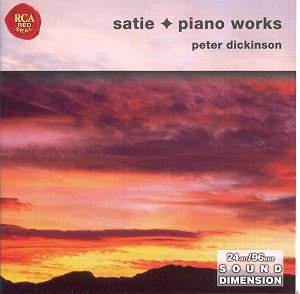Satie is a composer who defies description, and his
mysteriously poignant piano pieces, which make up about three-quarters
of his output, are his most representative music. By turns tender, solemn,
droll, witty and occasionally just plain boring, they have the same
quirky originality as his life and his love of flying in the face of
convention. They have certainly proved their appeal for record collectors,
judging by the amount of recital discs in the catalogue. Peter Dickinson’s
well-recorded survey, which was originally issued at mid-price by Conifer,
makes a welcome return at budget price. It is up against very stiff
competition from, among others, Pascal Rogé, Anne Queffélec,
Ronan O’Hora, Reinbert DeLeeuw and Jean-Philippe Collard, and it is
to Dickinson’s credit that he more than holds his own in this company.
Rather than ‘theming’ the items, as DeLeeuw does, Dickinson
opts for a general early-middle-late survey of the music, giving a good
overall picture of its many facets. He proves himself to be a sensitive
artist in this repertoire, and the sad tenderness of the ubiquitous
Gymnopédies comes over well. He may be slightly brisker
than some with the meltingly beautiful flow of Nos.1 and 3, but this
could be a conscious attempt to eschew an inappropriately romantic indulgence.
The odd discreet rubato is in evidence elsewhere, as in the delicious
little waltz, Je te veux (I want thee), where the café-cabarets
in which Satie played are beautifully evoked.
Of particular interest are the works of the mature
phase of his career, where characteristic caperings and banalities are
balanced by his concerns for lyrical balance, harmonic adventurousness,
and what became seen as a sort of proto-minimalism. Dickinson is remarkably
subtle in his approach here, giving due weight where required without
missing any sense of fun inherent in the music. The marvellous Sonatine
bureaucratique, for example, gives the right impression of Parisian
bustle and energy, without losing sight of the Clementi-style parody
constantly lurking beneath the surface.
The piano tone is very truthful, the digital recording
capturing the instrument’s sonority with clarity and presence. Booklet
notes are very fulsome and detailed for a budget reissue, and altogether
this attractive disc can be confidently recommended.
Tony Haywood
